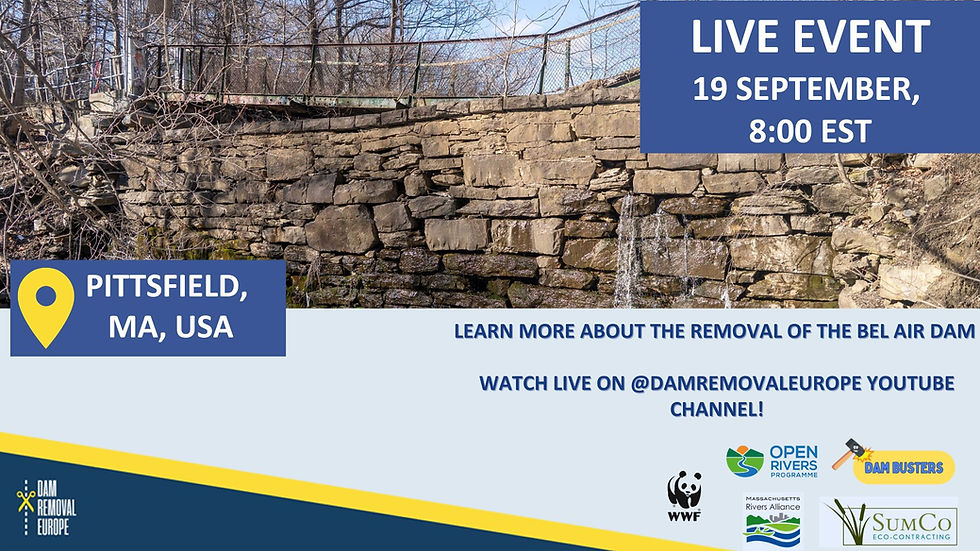Fight Back Against Federal Efforts to Limit Clean Water Protections
- Anna Renkert

- Sep 17, 2019
- 3 min read
There has been yet another attack on our federal protections for rivers and streams. We need your help to let Congress know this new proposal should be rejected!
A bill before Congress (H.R. 1764) would double the length of Clean Water Act (National Pollutant Discharge Elimination System or NPDES) pollution permits. The Clean Water Act currently requires local permits to be updated every five years. This ensures the most current science, technology, and understanding of water pollution and its impacts are incorporated into pollution limits. This bill would double that time to 10 years—an increase that is not backed by any credible justification.
This is an attack on one of the bedrock principles of the Clean Water Act and must be rejected. This change would allow wastewater and stormwater system operators to avoid updating technology for longer periods of time and it would undermine efforts to restore polluted waterways.
Please call your Member of Congress today and ask that they oppose this bill that puts our waterways at risk. A note that Rep. Stephen Lynch, MA District 8 is a member on the Committee reviewing this legislation.
Suggested talking points:
Hello, my name is ______________ and I live in ______________. I am calling to ask (insert Member of Congress) to oppose H.R. 1764 which would double the length of Clean Water Act pollution permits.
Updating permits every 5 years is necessary to ensure that dischargers are operating under the most up-to-date standards that will protect the environment and public health.
Information about water quality and the effectiveness of pollution reduction technology is constantly evolving. Watershed and receiving water conditions also change frequently, as do federal and state laws affecting the obligations of polluters. It’s important to update permit terms regularly to reflect these new conditions, information, and policies.
Thank you for your time and consideration.
For those seeking additional information:
What is a pollution permit?
The Clean Water Act (CWA) requires a National Pollutant Discharge Elimination System (NPDES) permit for any discharge of a pollutant through a point source into a waterbody covered by the Act.
NPDES permits contain limits on pollution discharges, monitoring and reporting requirements, along with other provisions. The Clean Water Act requires that these permits include:
Technology-based standards, which are based on up-to-date pollution control methods, and
Water quality-based limitations, which are designed to ensure compliance with local water quality standards
Why are the lengths of these permits important?
NPDES permits are issued every five years to ensure that permits reflect the most current information about control technologies and receiving water conditions. Five-year permit terms have been a key component of the Clean Water Act since it was enacted in 1972.
A key premise of the Clean Water Act is that, as environmental science and technology advance over time, the nation will make steady progress in reducing water pollution.
The statute requires EPA to regularly publish new information about the best available treatment technologies, and requires states to assess local water quality every two years and develop clean-up plans for waters that are no longer meeting standards.
In conjunction with these requirements, the Act imposes a five-year limit on NPDES permit terms to ensure that discharge limits are reviewed regularly to reflect the most up-to-date information.
If the Act were amended to allow permit terms of ten years or longer, dischargers would operate for a decade or more under pollution control standards that have long since become outdated.
It is only when NPDES permits are issued or renewed that members of the public have the opportunity to weigh in on the terms and limitations applying to pollution dischargers, or to seek judicial review of those permit terms if they are not legally sufficient. Doubling the length of permit terms would cut these
What should Congress be doing instead?
Congress should instead focus on increasing funding for infrastructure upgrades and encouraging states to properly resource their permitting agencies so they can reduce their permitting backlogs and update permits in a timely manner.
Congress should pass H.R. 1497, the bipartisan Water Quality Protection and Job Creation Act, which would significantly increase authorized funding for the Clean Water State Revolving Fund, the nation’s largest and most important source of federal funds for stormwater and wastewater infrastructure.





Comments